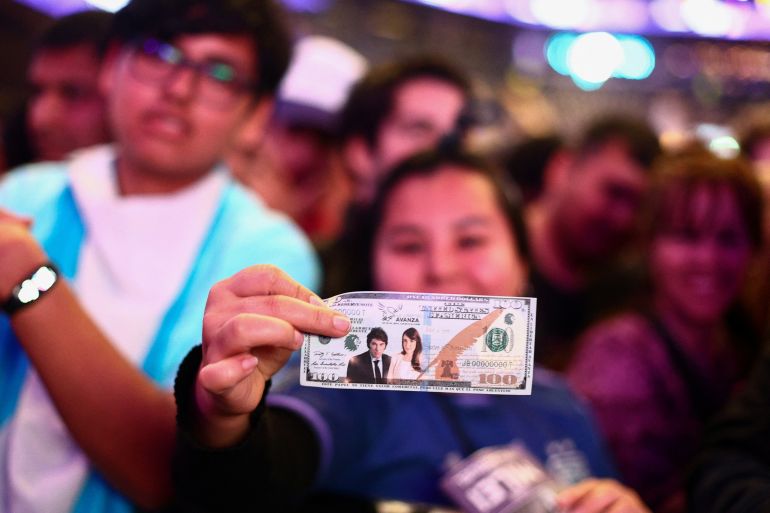Argentina election 2023: Here’s what to know
Argentinian voters head to the polls on Sunday amid skyrocketing inflation and as the country struggles to pay its debts.

Argentina’s voters head to the polls for a general election on Sunday. Here is what you need to know about the candidates and the issues voters are looking at:
When does voting begin?
The polls open on Sunday at 8am local time (11:00 GMT).
Keep reading
list of 3 itemsArgentina’s populist candidate Javier Milei holds economic talk with IMF
Inflation continues to climb in Argentina as presidential election nears
On August 13, presidential candidates were decided when the country held its open primary election.
Argentina is voting for a new president and vice president. The winners will take office on December 10. They are also voting for members of the National Congress and provincial governors, specifically 130 lower house representatives and 24 national senators.
Who are the main presidential candidates?
Javier Milei, the 52-year-old far-right populist leader of the Liberty Advances party was the eccentric frontrunner in the August primary. Milei identifies as an “anarcho-capitalist” and has garnered comparisons to far-right figures like Donald Trump in the US and Jair Bolsonaro in Brazil. Milei’s eccentricities are not limited to his messy hair and leather jackets: He owns multiple clones of his late dog Conan. Milei’s radical economic policies are gaining popularity among Argentinians. He believes in abolishing Argentina’s central bank and ditching the Argentinian peso in favour of the US dollar, as smaller countries like Ecuador and El Salvador have done.
Patricia Bullrich, 67, is a former security minister and is the candidate from the centre-right Together for Change coalition. Bullrich wants to quickly remove capital controls, cut spending to tackle inflation and lower taxes on farm exports, Argentina’s top economic engine.
Sergio Massa, 51, is the current minister of economy and the main “unity” candidate for the governing Peronist coalition, now called the Union for the Homeland. Massa, a pragmatic centrist, has been criticised by the left for cuts in social spending, while conservatives say he is not doing enough to reduce the fiscal deficit.
Who is Argentina’s outgoing president?
The outgoing president is left-wing Alberto Fernandez, who is not running for re-election. “It is clear we did not achieve everything we set out to do,” said Fernandez while announcing his decision in April.
Fernandez is leaving as Argentina faces economic problems alongside political infighting and controversy.
What are the key issues?
The economy is perhaps Argentina’s biggest issue as inflation continues to skyrocket, peaking at 138 percent in September. Additionally, Argentina also struggles to repay a large amount of international debt to the International Monetary Fund (IMF).
The incoming candidate will have to face the challenge of reviving Argentina’s economy, which continues to worsen. JP Morgan has postulated that inflation will 210 percent at the end of 2023, whereas a poll conducted by Central Bank forecasts 180 percent.
Argentina is also part of the South American trade bloc Mercosur which is hoping to sign a trade deal with the European Union. The incoming candidates’ decisions could determine the trajectory of this deal. Milei has pledged to pull out of Mercosur. Overall, the election’s results will affect Argentina’s relationship with other South American countries including Brazil.
Climate change is also an issue that looms over Argentina’s political landscape after the country experienced historic droughts this year. As a result, food prices went up and the economy suffered.
Also at stake is the future of abortion rights in Argentina. In 2020, the country’s Congress legalised the procedure up to the 14th week of pregnancy, permitting it at later stages as well in cases of rape or risk to the mother’s health. But Milei has promised to hold a referendum on abortion rights. He has described abortion as “murder”.
How do elections work in Argentina?
By law, Argentinians between the ages of 18 and 70 are required to vote.
To win the presidency in the general elections, a candidate needs 45 percent of the vote, or 40 percent plus a 10-point lead over their closest competitor.
When do the polls close?
Voting ends at 6pm local time (21:00 GMT) on Sunday.
When will the results be announced?
The results are expected to be announced on Monday at 9pm local time (00:00 GMT).
Who is leading the polls?
Milei is leading in most polls with Massa in second place and Bullrich in third.
However, Argentina’s pollsters have failed to accurately predict the results of previous elections including the the 2019 presidential elections and the recent primaries where several analysts predicted that Milei would be in third place.
Can there be two winners?
It is expected that there will be two winners. In this case, the top two will go through a second round for a runoff election on November 19.
This is because electoral polling data shows the difficulty for front-runner Milei, to obtain 45% of the votes or to create a 10% gap with the second candidate, Associate Professor at University of Sao Paulo Pedro Feliú Ribeiro told Al Jazeera.
Riberio added that while Massa is ahead of Bullrich in the polls, the difference is within the margin of error of the polls. “Thus, Milei could face both Massa or Bullrich, creating two very distinct scenarios.”
Riberio predicts that Milei will face Massa in the runoff and Bullrich’s voters will be divided between the two. “Since Bullrich and [Mauricio] Macri’s political group is anti-Peronist, there is a high probability of Milei winning,” said Riberio.
He added that if Milei faces Bullrich, the entire left is likely to vote against the radical right Milei, reducing his chances of winning.